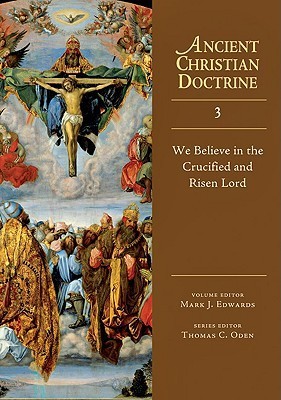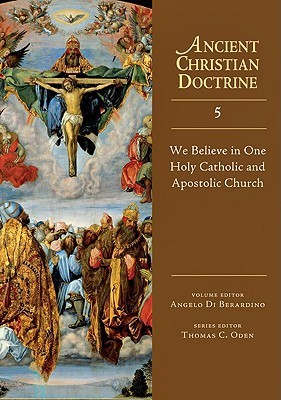


Books in series

#1
We Believe in One God
2009
The first article of the Nicene Creed also presupposes that there is an objective body of teaching that Christians are expected to confess as their faith. This idea seems normal and natural to us, but it was a novelty in the ancient world. Neither Judaism nor any pagan religion or philosophy could claim to have a closely defined set of beliefs that everyone adhering to it was expected to profess publicly and defend against all comers. While this article on God the Father is the shortest and arguably oldest portion of the Creed, it fully sets forth the fundamental understanding of God as creator and originator of all that is. This commentary in its selection of texts from the early church highlights the common understanding of the One God in three Persons, elucidating the church's understanding of divine attributes and trinitarian relations.

#2
We Believe in One Lord Jesus Christ
2009
Who do you say that I am?" This question that Jesus asked of his disciples, so central to his mission, became equally central to the fledgling church. How would it respond to the Gnostics who answered by saying Jesus was less than fully human? How would it respond to the Arians who contended he was less than fully God? It was these challenges that ultimately provoked the Council of Nicaea in A.D. 325. In this volume covering the first half of the article in the Nicene Creed on God the Son, John Anthony McGuckin shows how it countered these two errant poles by equally stressing Jesus' authentic humanity (that is, his fleshliness and real embodiment in space and time) and his spiritual glory or full divinity. One cottage industry among some historical theologians, he notes, has been to live in a fever of conspiracy theory where orthodox oppressors dealt heavy-handedly with poor heretics. Or the picture is painted of ancient grassroots inclusivists being suppressed by establishment elites. The reality was far from such romantic notions. It was in fact the reverse. The church who denounced these errors did so in the name of a greater inclusivity based on common sense and common education. The debate was conducted generations before Christian bishops could ever call on the assistance of secular power to enforce their views. Establishing the creeds was not a reactionary movement of censorship but rather one concerned with the deepest aspects of quality control. Ultimately, what was and is at stake is not fussy dogmatism but the central gospel message of God's stooping "down in mercy to enter the life of his creatures and share their sorrows with them. He has lifted up the weak and the broken to himself, and he healed their pain by abolishing their alienation.

#3
We Believe in the Crucified and Risen Lord
2009
The resurrection changed everything. "But for the resurrection," writes Mark J. Edwards, "there would have been no reason to argue for a union of two natures in the person of Christ, let alone for a dyad or triad in the Godhead. All that he had said and done in the course of his earthly ministry would have sat well enough with the character of a prophet who excelled such predecessors as Isaiah and John the Baptist only in power and closeness to God." That is the story that unfolds as Edwards gathers together the most salient comments from the early church on the latter half of the second article of the Nicene Creed on God the Son as the crucified and risen Lord. The deliberations of ancient Christian writers on these matters are regarded now as the nucleus of Christology. The work of Christ is customarily considered, in Western Christendom at least, as the principal object of his coming. That Christ died for our sins was an axiom of all apostolic preaching. In this Ancient Christian Doctrine volume we see that the doctrines of the Trinity and the incarnation were not the second thoughts of Christendom after its encounter with Greek philosophy. Rather they were forced on the church by its refusal to adopt the polytheism of the Greeks as a means of reconciling the sovereignty of God with the exaltation of Christ as Lord. It is ultimately in the work of Christ that the essentials of his Person are revealed. The church's early teachers ultimately combine to denounce the critical maneuvers that would persuade us that the Scriptures do not mean what they plainly say. Here, as throughout the Creed, we see how the early church rooted all its claims in Scripture. The five-volume Ancient Christian Doctrine series follows up on the acclaimed Ancient Christian Commentary on Scripture to provide patristic commentary on the Nicene Creed, translating source material from the church fathers into English for unparalleled insight into early church history.

#5
We Believe in One Holy Catholic and Apostolic Church
2009
When was the church founded? Jesus spoke of the kingdom of God and not of a religious organization subsequently called church. We don't find in the Gospels expressions which make reference to the foundation of a new religious community, a new and distinct community of followers of Jesus. But after the resurrection of Jesus, his followers, as a result of his express command, gather together not only those from the people of Israel but men and women of all nations. The final clauses of the Nicene Creed spell out, briefly and to the point, the church's self-understanding in these early centuries. Angelo Di Berardino assembles a wide range of texts and teachers of the church during these years to enrich our understanding and deepen our faith in the great mysteries expressed here. The Creed quickly hits the four marks of the church―that it is "one holy catholic and apostolic." What do we mean by professing each of these? Di Berardino helps us to give an answer with the help of the fathers of the church. The volume closes, as does the Creed, with a consideration of baptism (the traditional entrance for people into the church) and two central features of the church in the future―the expectation that all of God's people will enjoy the resurrection of the dead and the life of the world to come. The five-volume Ancient Christian Doctrine series follows up on the acclaimed Ancient Christian Commentary on Scripture to provide patristic commentary on the Nicene Creed, translating source material from the church fathers into English for unparalleled insight into early church history.
Authors

Gerald L. Bray
Author · 18 books
Gerald L. Bray (Ph.D., University of Paris—Sorbonne) is director of research for the Latimer Trust, based in London, and a research professor at Samford University, teaching in the Beeson Divinity School in Birmingham, Alabama. A priest of the Church of England, Bray has also edited the post-Reformation Anglican canons. He has edited several volumes of the Ancient Christian Commentary on Scripture and Ancient Christian Texts, as well as volume one of the Ancient Christian Doctrine series, all for IVP Academic. General EditorTimothy George (Th.D., Harvard University) is a renowned Reformation historian and author of Theology of the Reformers, as well as many other theological and historical works. He is founding dean of Beeson Divinity School of Samford University and an executive editor of Christianity Today.
John Anthony McGuckin
Author · 12 books
John Anthony McGuckin is the Nielsen Emeritus Professor of Byzantine Christian Studies at Union Theological Seminary and Columbia University, and currently professor of early Christianity in the Theological Faculty of Oxford University. An archpriest of the Romanian Orthodox Church and Fellow of the Royal Historical Society, he has written more than thirty scholarly books. He lives in the UK.